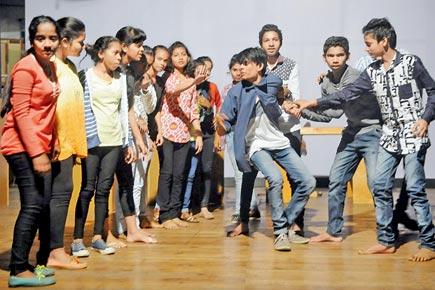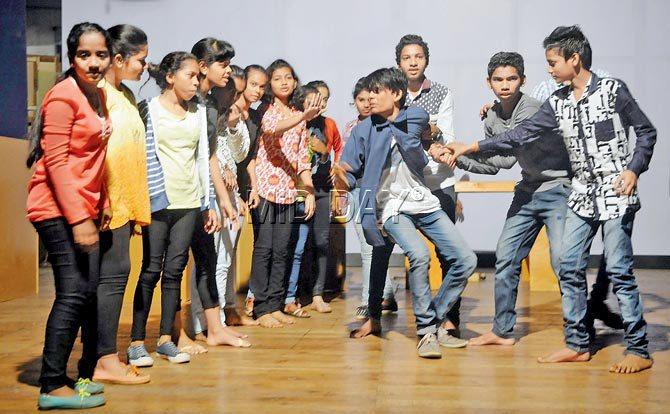Watch these kids take the audience back to an age of innocence in Hindi cinema with a stage adaptation of Chalti Ka Naam Gaadi


Children from the Salaam Bombay Foundation rehearse the play. Pic/Datta Kumbhar
 When the world seems to be off kilter, thankfully, there are some things that are still capable of warming the cockles of the heart. Watching a stage production of the classic comedy Chalti Ka Naam Gaadi, performed by kids from the Salaam Bombay Foundation (SBF) would count as one.
When the world seems to be off kilter, thankfully, there are some things that are still capable of warming the cockles of the heart. Watching a stage production of the classic comedy Chalti Ka Naam Gaadi, performed by kids from the Salaam Bombay Foundation (SBF) would count as one.
ADVERTISEMENT
The SBF, with Padmini Somani as founder and director, works with underprivileged children and one of the initiatives is the Salaam Bombay Academy of the Arts, which works with 12 to 17-year-olds and trains them in the performing arts. (Earlier this year, the kids from the Academy had won the Stage Right inter-school drama competition, with a wonderful mime production of The Caucasian Chalk Circle).
Chalti Ka Naam Gaadi is based on the 1958 film directed by Satyen Bose, which starred the Ganguly brothers, Ashok, Anoop and Kishore, with Madhubala. Not an obvious choice to convert to a stage play, though it has been updated to modern times with references that today’s audiences would get (written by Ashok Mishra). In spite of the jeans, T-shirts and mini skirts worn in the play, it still takes the audience back to an age of innocence in Hindi cinema.
It is the story of three brothers who run a garage. The eldest Brijmohan/Birju (Ashok Kumar), who had his heart broken in the past, hates women and does not allow his younger brother Jagmohan/Jaggu (Anoop Kumar) and Manmohan/Mannu (Kishore Kumar) to speak to women. (In the play, he also does not allow them to use mobile phones!) The younger ones obey their Bade Bhaiyya without question. Mannu is boisterous by nature, but Jaggu, who keeps parroting Bade Bhaiya’s lines, is terrified of women.
Then, Renu (Madhubala) comes to the garage on a rainy night (Ek ladki bheegi bhaagi si) and the rich heiress falls in love with the nutty Manmohan, even though he crashes into her dance show demanding his Paanch rupaiya baraah aana (paanch sau in the play, keeping inflation in mind), and breaks into her house to demand his money too!
Only in those good ol’ days would a crook conspire to get a henchman married to a rich girl to usurp her property. Today, no father would fix a match for his daughter because the father of the groom claims to be a Rajasaheb; he would do a background check at least.
The director of the play, Chittaranjan Tripathi, and the teens who performed the play, retained the madcap spirit of the film, and added some of their own. Rajkumar Salve, who plays Mannu, was more Salman Khan (pelvic thrusts and all) than Kishore Kumar but had the energy and comic timing required for the part. Heroines back in the day had little to do in such films, except look pretty and do the song-and-dance numbers well —more song than dance, actually (and what great SD Burman compositions the film had!) With choreographer Norden Sherpa, the SBF kids added a lot of zing to the dance numbers, and performed with a sense of abandon — the girls wearing costumes they are probably not used to in real life!
The backstage crew was perfectly coordinated too, the video projections, sets and props whipped on and off the stage in seconds. These actors and crew are young amateurs, but have developed an expertise that would be the envy of professionals. It is clear they worked hard, aimed to please the audience and basked in the appreciation. It would be a pity if some of the really talented youngsters, who want to make a career in theatre (or showbusiness), are unable to get the right opportunities because they come from underprivileged backgrounds and may not have the resources and network to get in the door.
The other thing that this production and the grand Mughal-e-Azam a few weeks ago proved, is that there is a goldmine waiting to be tapped. Popular films — particularly those of the fifties — have what it takes to make fine stage productions. The plots are simple and laden with genuine emotions, the songs are fabulous; with a reworking of the music and choreography, ‘retro’ can attract a new audience who may not be familiar with the films, but would recognise the seal of excellence that a classic carries.
Unlike Hollywood, there has not been much of a give and take between stage and cinema, but it’s never too late to start. At least in Mumbai, audiences are ready to pay good money for a live show, if it offers the entertainment our movies often fail to provide.
Deepa Gahlot is an award-winning film and theatre critic and an arts administrator. She tweets @deepagahlot. Send your feedback to mailbag@mid-day.com
 Subscribe today by clicking the link and stay updated with the latest news!" Click here!
Subscribe today by clicking the link and stay updated with the latest news!" Click here!







